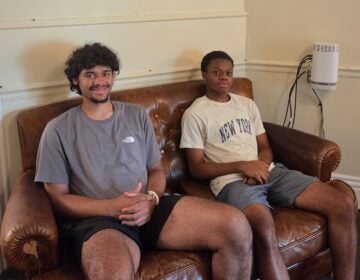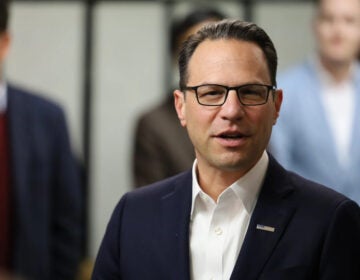African Community Learning Program founder semifinalist in Wharton startup challenge
Aminata Sy's after-school African Community Learning Program helps African immigrants adapt by teaching them about their own cultures - and empowering them along the way.
-
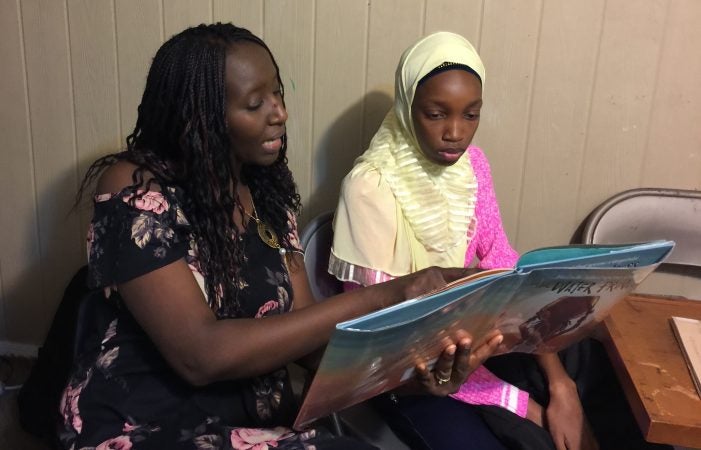
Aminata Sy reading to Dieynaba, an eighth-grader from Senegal who recently came to the U.S. (Photo courtesy of Aminata Sy)
-
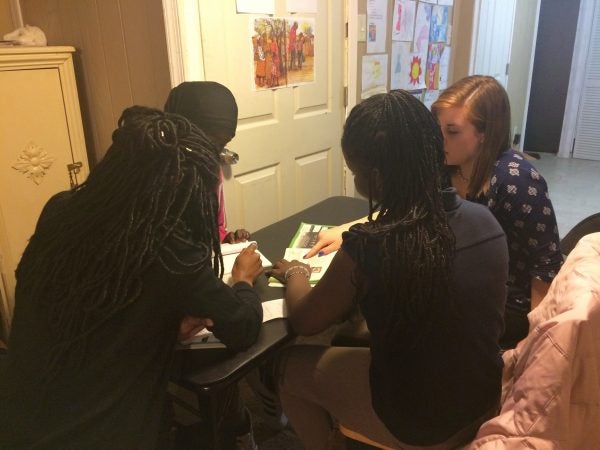
(Photo courtesy of Peak Johnson)
-
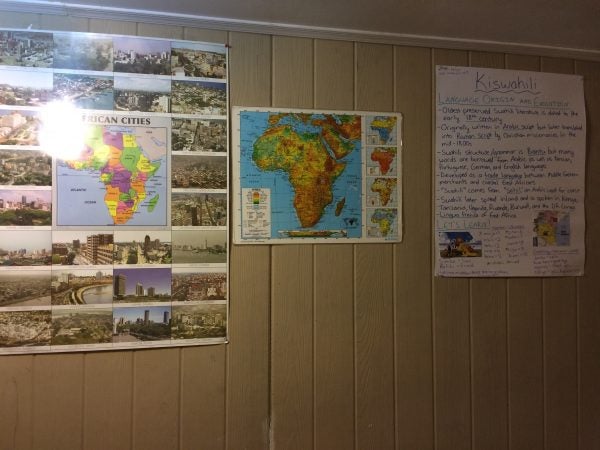
(Photo courtesy of Peak Johnson)
-
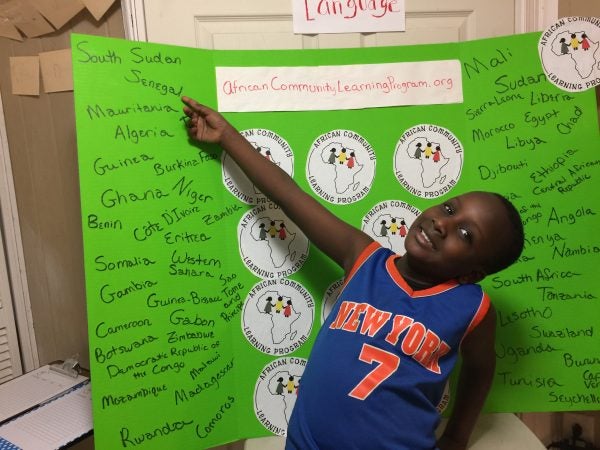
Aminata Sy's son, Ibra, is part of the African Learning Center Program. (Photo courtesy of Aminata Sy)
-
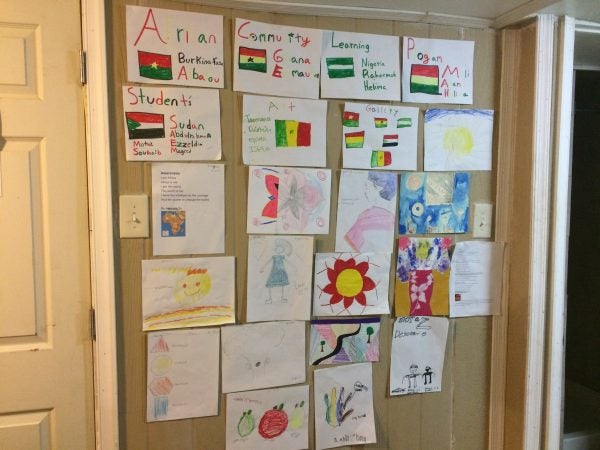
(Photo courtesy of Peak Johnson)
-
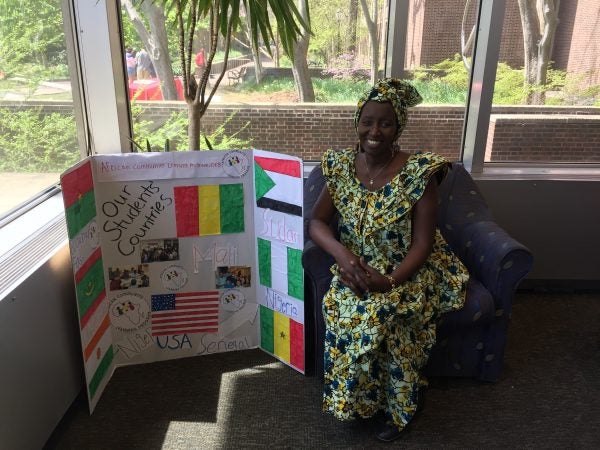
Aminata Sy sits at Penn's Van Pelt Library. (Photo courtesy of Aminata Sy)
-
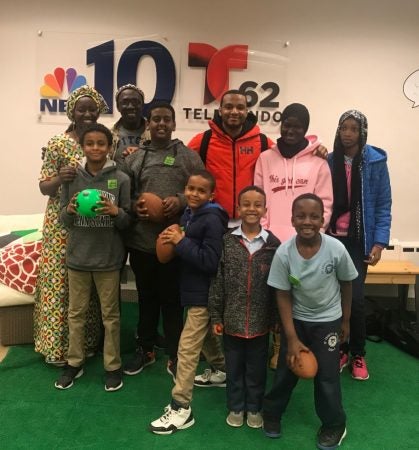
The African Learning Center Program students recently toured the NBC10 station. (Photo courtesy of Aminata Sy)
Walk down into Aminata Sy’s West Philadelphia basement, and you’ll see color splashed on the walls. There are self-portraits and large, red suns drawn in crayon, as well as maps of Africa highlighting the different countries of the continent.
Sy, originally from Kinshasa, the capital of the Democratic Republic of Congo, and later Senegal, runs the African Community Learning Program (ACLP) in the basement of her home. She welcomes and teaches first- through eighth-graders from African countries as diverse as Sudan, Nigeria and Burkina Faso about their culture and background. About a dozen students arrive each day after school for instruction and guidance from Sy and her volunteers.
Africans make up 7 percent of Philadelphia’s immigrant population, and a large, burgeoning community lives in Southwest Philadelphia.
ACLP is a semifinalist in the overall competition for the Penn Wharton Entrepreneurship Startup Challenge and a finalist in the social-impact category. On Thursday, Sy, who is also an international relations student at the University of Pennsylvania, pitched her program with hopes of winning the $10,000 prize. Should she win, she would use the funds to expand her program or restructure it into possibly an English as a second language program, both for her students and their parents. The winners will be announced Friday.
Sy launched the African Community Learning Program in October because she didn’t want her students to lose their identity. With little to start the program, she and her husband transformed the basement of their home into a comfortable school-like setting for the students, most of whom attend school in West Philadelphia.
Students receive help with their homework and language skills, and they focus on different themes relating to the African continent and their home countries. In February, for example, Sy focused on black historical figures from Africa. Even Sy’s 6-year-old son, Ibra, participates in the program.
Sy arrived in the United States almost 20 years ago. She remembers staying home alone most of the time while her husband worked.
“I felt lost in so many ways. I felt lost because, in Senegal, the life that I was used to is more family-oriented,” Sy said. “When I looked at the news, it was extremely fast for me. I couldn’t understand what was going on. It really took some time for me to get comfortable with the rhythm because I felt like America was moving very fast.”
Sy had to learn about the concept of race, which she said was different from when she lived in Senegal. It was not until coming to America and interacting with people that she learned that there was a different meaning to what it means to be black in the U.S.
“It’s important to me to teach kids about culture, ethnicity and their background because I personally struggled a lot with cultural adaptation in different spaces,” Sy said. “I know how hard it can be for someone to adjust to a new space, and I also know that if you embrace that part of yourself, whatever the cultural background is, it empowers you as a person.”
When working with students from so many different African countries, language can sometimes be an issue, Sy added. One challenge she has found is getting students to give their complete attention, especially when there are language barriers.
“Listening is something that I think is not just hard for kids, it’s also hard for grown-ups,” Sy said. “Even if the person is 6 or 7, I tell them it doesn’t matter; we all deserve the same level of respect. That’s something that is very important to me, that we first have to start from a point of respect, no matter what age.”
Abdel Mageed Aduln, 12, has been a part of Sy’s program for six months now. From North Sudan, he has enjoyed learning about other African cultures. Broadening their perspectives is one of the goals that Sy has for her students, and ultimately understanding that they all have backgrounds of which they they can be proud.
“Culture actually doesn’t matter where you come from in Africa,” Abdel said. “You’re all human beings, and you’re all one person, and you’re not supposed to judge a country. Before I came here, I had lots of judgment about other parts of Africa and stereotypes that I heard. I learned that these judgments are fake.”
Abel added that he would recommend students who wish to become better English learners attend the African Community Learning Program. It made a difference for him, as well as improving his spelling, which was sometimes a weakness.
Temple Rhodes scholar Hazim Hardeman is one of seven volunteers with ACLP and also serves as the organization’s secretary. He’s known Sy since they met at the Community College of Philadelphia. He decided to volunteer at the program to give back and provide students experiences that they might not have otherwise.
“I think ACLP offers one of the few spaces where students can come and have their experiences affirmed, their identities valued, and their stories told,” Hardeman said. “They can experience and interact with people who look like them, people who share similar stories to them. In a lot of spaces, it isn’t focused specifically on the empowerment, in terms of the heritage a lot of these children come from.”
Hardeman added that the mission of empowerment and offering opportunities to succeed with education makes the African Community Learning Program a special place to be.
“The reason why I’m always in here is that Aminata created this out of nothing,” Hardeman said. “Oftentimes we can be crippled by the fact that we don’t have the most resources, but she did this with little more than her own determination and vision. I think that’s really inspiring for other people who want to see change in the world.”
While Sy’s immediate plan is to expand, she hopes to get more volunteers to work with ACLP — and more support as well.
“When you’re starting something new, it’s like putting one foot in front of another. There are many, many things that I never even thought that comes with putting a program together that I have learned,” Sy said. “One of the main first goals is to really have a space that’s going to accommodate more students, because I do have people who reach out to me who want their kids to get involved. You never know.
“We could expand with different groups as well, like African-American students, Hispanic students, but I feel like you have to have one solid strong foot on the ground first before you are able to expand, and I think that’s important.”
WHYY is your source for fact-based, in-depth journalism and information. As a nonprofit organization, we rely on financial support from readers like you. Please give today.



